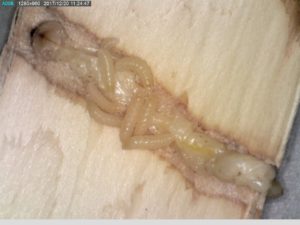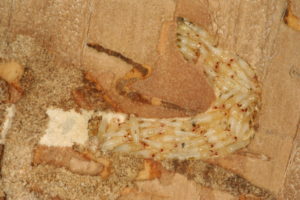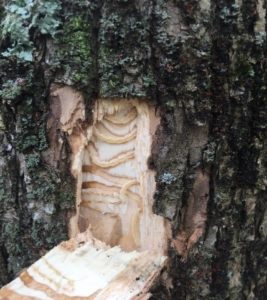The U.S. Department of Agriculture’s (USDA) Biological Control Facility is seeking donations of living green ash trees from Wisconsin landowners. Infested live trees are needed to rear the parasitic wasps that prey upon emerald ash borer (EAB) eggs and larvae.
USDA staff in Brighton, MI rear stingless, parasitic wasps for release in EAB-infested states. Currently, the biological control facility rears four species of wasp, three of which attack EAB larvae and one that attacks eggs. Finding and harvesting living green ash infested with EAB is a vital part of the biocontrol program, allowing staff to breed EAB colonies from adult beetles. These colonies then support the rearing of almost a million parasitic wasps each year. To learn more about the USDA’s EAB Program, read the EAB Story Map.

The stingless wasp Spathius agrili lays up to 20 eggs on its host. Eggs hatch and the larvae feed and eventually kill the EAB larva.

Another wasp, Tetrastichus planipennisi, lays its eggs inside EAB larvae where they feed and develop into red-eyed pupae before completing their life cycle.
The facility is looking for donations from properties that meet the following criteria:
- Live green ash between 8-20 inches diameter
- 25 or more suitable ash trees
- Trees may show signs of decline but must be alive
- Located in southeastern and eastern Wisconsin north up to Green Bay
USDA staff will conduct landowner site visits after leaves have budded in spring. If a site meets most of the criteria, staff will return in late summer to peel back bark of trees one by one. This is the EAB larval evaluation method used to determine infestation levels. Trees are then selected for harvest based on that methodology.

USDA staff evaluate ash trees for harvest by cutting a ‘bark window’ to estimate the degree of infestation from the live EAB larvae they see.
Harvests will occur weekdays from September to May. The USDA will arrange the harvests, including selecting subcontractors and paying for the work. Sites are remediated to pre-harvest conditions to the best of the contractor’s ability.
Lands enrolled in Wisconsin’s Managed Forest Law (MFL) or Forest Crop Law must file a MFL Cutting Notice (Form 2450-132) 30 days prior to cutting. Contact your local Tax Law Forestry Specialist for assistance.
All private landowners must submit a county cutting notice prior to harvest. This cutting notice is separate from the MFL cutting notice and should be filed with the county clerk. Learn more about cutting notices at this DNR webpage.
For more information about the USDA program and if you are interested in participating, contact Paul Nelson at paul.m.nelson@aphis.usda.gov or 734-732-0025.
